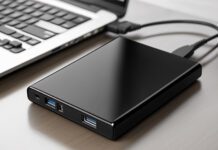We recommend that every computer, notebook, and server run an enterprise-class anti-malware solution. The one tech safeguard of this kind we like best is thirtyseven4.com. It is a terrific balance of cost and features.
- When you receive an email, be very cautious of any links included. If the sender was someone you expect to receive email from (if not, delete the email!), hover your mouse over the link so you can see where it’s planning to take you. Doing so should show you the link’s details; doing this can save you big headaches and money.
- If you receive attachments, always save them to your desktop before opening them. Doing so will ensure they are scanned by your anti-malware solution, and putting them on your desktop will remind you to delete or move them later!
And never connect your computer to public WiFi. Instead, use the hotspot included in your smartphone. The speed will be a bit slower, but the connection will be secure.
Mobile Device Best Practices
In addition to not connecting to public hotspots, do not use public USB chargers—even when they’re in places you might consider safe (like an airport or hotel room). You don’t really know if the port is safe.
The USB charging port shipped with your device is safe, as well as those you buy from the smartphone manufacturer. Only trust those.
Training is Essential
The least expensive way to safeguard your organization is through training. The problem, though, is that IT training is never fun, so many tune it out. There is a solution! And it is very inexpensive!
We recommend setting up an account with KnowBe4.com—make certain you let them know that my firm, MBS, referred you to receive up to a 55% discount on their published rates! KnowBe4 will email those in your organization on a periodic schedule, like monthly, with authentic looking emails. Anyone who responds to the email incorrectly—clicking on a potentially dangerous link, for example—will have to watch a short video about why they shouldn’t have done whatever they did. Organizations using this tool have seen their team go from more than 85% having bad habits to under 10%!
Regarding the one-off requests for money, as a tech safeguard remind your staff regularly that no requests will ever be made by email, fax, or phone. Only in-person requests should be considered valid.
So, as we get ready to begin venturing out of our homes and traveling again—whether locally or further, keep these tech safeguards steps in mind. And keep your phone charged!











